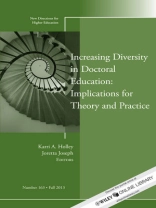Diversity is defined as those numerous elements of differencebetween groups of people that play significant roles in socialinstitutions, including (but not limited to) race and ethnicity, gender, socioeconomic class, sexual orientation, and culture. Sincedoctoral degree recipients go on to assume roles as faculty andeducators, diversity in doctoral programs is significant. Bysupporting graduate diversity across the academic disciplines, universities ensure that the nation’s intellectual capacitiesand opportunities are fully realized.
The authors consider diversity broadly from multiple perspectives, from race and ethnicity to institutional type, academic discipline, and national origin. They demonstrate how diversity operatesthrough these venues and definitions, and hope to stimulate aconversation about a key aspect of American highereducation.
This volume is the 163rd volume of the Jossey-Bass quarterlyreport series New Directions for Higher Education.Addressed to presidents, vice presidents, deans, and other highereducation decision makers on all kinds of campuses, New Directions for Higher Education provides timely informationand authoritative advice about major issues and administrativeproblems confronting every institution.
สารบัญ
EDITORS’ NOTES 1
Karri A. Holley, Joretta Joseph
1. Increasing the Visibility of Women of Color in Academic Science and Engineering: Professional Society Data 7
Lisa M. Frehill, Rachel Ivie
Professional societies collect a wealth of data onunderrepresented scholars in specific disciplines that can be usedto understand minority experiences throughout different stages ofacademia.
2. From Graduate School to the STEM Workforce: An Entropic Approach to Career Identity Development for STEM Women of Color23
Kelly Mack, Claudia Rankins, Kamilah Woodson
Career development programs for graduate students shouldacknowledge the multiple and often conflicting demands placed onunderrepresented scholars.
3. Motivating Latina Doctoral Students in STEM Disciplines35
Elsa C. Ruiz
Latina students who enter higher education and aspire tograduate degrees encounter numerous obstacles along the academicpipeline that ultimately shape their graduate schoolperspectives.
4. The Challenges of First-Generation Doctoral Students 43
Susan K. Gardner
Students who are the first in their families to graduate fromcollege have significant challenges and yet comprise a significantpercentage of the number of awarded doctorates in the United States.
5. Family-Friendly Policies for Doctoral Students 55
Jaime Lester
Doctoral students can face unique obstacles in terms ofbalancing the demands of a graduate program with personalobligations.
6. The Impact of Historically Black Colleges and Universities on Doctoral Students 67
Joretta Joseph
Historically Black colleges and universities have long served asan important source for minority undergraduates who later go on toreceive a doctoral degree.
7. The Experiences of Minority Doctoral Students at Elite Research Institutions 77
Eva Graham
Minority doctoral students at elite and highly competitiveprivate research universities encounter distinctive challenges thatcan impact persistence, time to degree, and professionaloutcomes.
8. Contributions of Foreign-Born Faculty to Doctoral Educationand Research 89
Ketevan Mamiseishvili
Foreign-born faculty play an important role in American doctoraleducation, contributing to the processes of internationalizationand global collaboration.
9. How Diversity Influences Knowledge, Identity, and Doctoral Education 99
Karri A. Holley
Diversity contributes to the development of an academic identityas well as the production of knowledge, both essential componentsof doctoral education.
INDEX 107
เกี่ยวกับผู้แต่ง
Karri A. Holley and Joretta Joseph are the authors of Increasing Diversity in Doctoral Education: Implications for Theory and Practice: New Directions for Higher Education, Number 163, published by Wiley.












